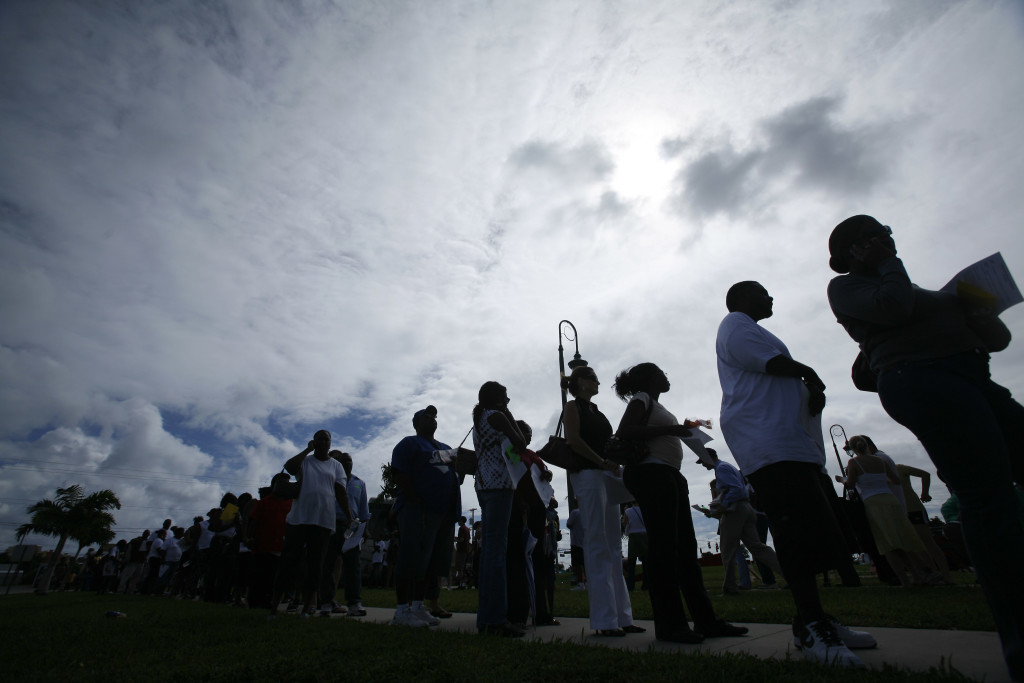Court Rules Florida’s Early Voting Restrictions are Discriminatory

August 17, 2012
Share
As Florida works on its contested voter-roll purge, a judge has ruled against a new restriction on early voting in some counties, saying it discriminates against blacks.
In recent years, Florida voters could go to the polls for 14 days before Election Day, with the booths open for a maximum of 96 hours over that period, usually eight hours Monday through Friday, and four hours each on Saturday and Sunday.
Under a new election law passed this year, the early voting window has been shortened to eight days, with a minimum number of 48 total hours. While election officials still have the cap of 96 hours, officials aren’t mandated now to use all of that time.
Chris Cate, a spokesman for Florida’s secretary of state, said that the new law would give voters plenty of time to get to the polls.
But five of Florida’s 67 counties are still covered under the Voting Rights Act, the federal law that bans discriminatory voting practices. This means that officials can’t make any changes to voting laws in these counties without clearing the changes with the Justice Department.
On Thursday evening, the U.S. District Court in Washington, D.C. rejected the early voting change in those five counties, ruling [pdf] that the changes seem likely to keep minorities from going to the polls. “The State has failed to satisfy its burden of proving that those changes will not have a retrogressive effect on minority voters,” it said.
African-Americans in Florida were much more likely to vote early than whites in four of the five most recent federal elections, according to court testimony from Professor Paul Gorke, an expert on the practice from the Early Voting Information Center, a nonpartisan research center based in Reed College, Ore.
In 2008, 54 percent of Florida’s African-American voters in Florida voted early — twice the rate of whites, according to Gorke, who testified for the Justice Department in this case. In 2010, early black voters exceeded early white voters by about a third.
Blacks also voted at nearly double the rate of whites in the first five days of early voting, Gorke told the court. Those are the days that state officials want to eliminate this year.
In its ruling, the court noted that the state’s own expert witness acknowledged he could “see the pattern” of higher levels of early voting among blacks. Florida’s expert, M.V. “Trey” Hood, an associate professor at the University of Georgia, also said it was “more likely than not” that that trend would continue in November.
The ruling only affects five counties, meaning that the early voting change will still be implemented in the rest of the state.
Yesterday’s decision is the latest in a string of court cases on a spate of restrictive voter laws that have been passed by Republican-led state governments in the run-up to the 2012 election. Earlier this week, a Pennsylvania judge upheld a law that requires a valid photo ID, even though state officials said that about 758,000 eligible voters didn’t yet have proper identification. And voting rights advocates are waiting for a decision in Ohio about whether certain provisional ballots will count.
Read more: Voting Cases in Battleground States: A Cheat Sheet
Florida has gained attention not only for its changes to voting law this year, but its potential motives. A former GOP chairman has said that party officials had held meetings to talk about “keeping blacks from voting.” Current GOP state officials deny these discussions and say Greer is trying to taint the party. Greer was forced to resign his position in 2010 amid allegations he had mishandled party money, and now faces six charges of money laundering and fraud.

Latest Documentaries
Explore
Policies
Teacher Center
Funding for FRONTLINE is provided through the support of PBS viewers and by the Corporation for Public Broadcasting, with major support from Ford Foundation. Additional funding is provided the Abrams Foundation, Park Foundation, John D. and Catherine T. MacArthur Foundation, Heising-Simons Foundation, and the FRONTLINE Trust, with major support from Jon and Jo Ann Hagler on behalf of the Jon L. Hagler Foundation, and additional support from Koo and Patricia Yuen. FRONTLINE is a registered trademark of WGBH Educational Foundation. Web Site Copyright ©1995-2025 WGBH Educational Foundation. PBS is a 501(c)(3) not-for-profit organization.



















